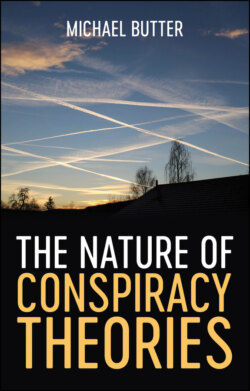The Nature of Conspiracy Theories

Реклама. ООО «ЛитРес», ИНН: 7719571260.
Оглавление
Michael Butter. The Nature of Conspiracy Theories
Contents
Guide
Pages
The Nature of Conspiracy Theories
Copyright page
Acknowledgements
Introduction, or: What’s the plan?
Notes
1 ‘Everything is planned’, or: What is a conspiracy theory?
Characteristics
Typologies
Conspiracy theories and real conspiracies
The term as a means of delegitimization
Conspiracy theories as theories
Notes
2 ‘Nothing is as it seems’, or: How do conspiracy theorists argue?
Structure and strategies of argumentation
Evidence
Countering the official version
Case study: Daniele Ganser
Metaphors and more
Notes
3 ‘Everything is connected’, or: Why do people believe in conspiracy theories?
Functions
Are conspiracy theories for losers?
Propaganda and commerce
Case study: Alex Jones
Notes
4 The story so far, or: How have conspiracy theories evolved historically?
Emergence and development up to the twentieth century
Delegitimization and stigmatization after 1945
Case study: the myth of the global Jewish conspiracy
Conspiracy theories and populism
Notes
5 Current trends, or: How is the internet changing conspiracy theories?
The ‘truth’ is just a Google search away
Relegitimization in the echo chamber
From conspiracy theories to conspiracy rumours
Case study: Donald Trump
Notes
Conclusion: When are conspiracy theories dangerous and what can we do about them?
Notes
Index
POLITY END USER LICENSE AGREEMENT
Отрывок из книги
Michael Butter
Translated by Sharon Howe
.....
Perhaps the strongest argument against conspiracy theories, however, is that they are rooted in a view of human agency and history that has been radically challenged by the modern social sciences. Conspiracy theories are based on the assumption that human beings can direct the course of history according to their own intentions – in other words, that history is plannable. They credit conspirators with the ability to control the destiny of a country or even the world for years or decades at a time. Indeed, they often understand history as a series of plots by one or various groups. Consequently, they have a fundamentally different view of the world from that of psychology, sociology or political science. According to psychology, the ego is not master in its own house, as Sigmund Freud famously put it; in many cases, we don’t know exactly what we do or don’t want, and find it accordingly difficult to act on our intentions. But even if we did always know our own desires, we still couldn’t achieve them, since social systems – as sociology and political science have shown – have a life of their own and generate effects that no one intended.
Few people have articulated this insight as clearly as Karl Popper. In the second volume of The Open Society and Its Enemies, he begins the chapter ‘Marx’s Method’ with a general discussion of why human beings ‘are, if anything, the product of life in society rather than its creators’. He does not of course deny that ‘the structure of our social environment is man-made in a certain sense’, but stresses that this is only part of the story: ‘even those [institutions and traditions] which arise as the result of conscious and intentional human actions are, as a rule, the indirect, the unintended and often the unwanted by-products of such actions’. The task of the social sciences, he therefore concludes, is to investigate these unintended consequences and, ideally, predict them.14
.....